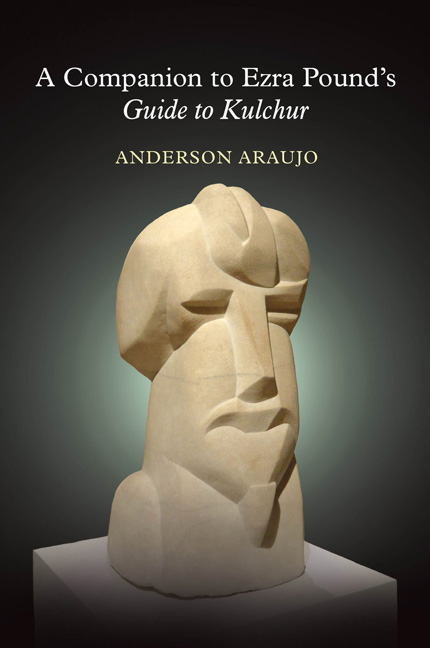Book contents
- Frontmatter
- Contents
- Acknowledgments
- Abbreviations
- Introduction
- Guide to Kulchur
- Part I
- Section I
- Section II
- Part II
- Section III
- Section IV
- Part III
- Section V
- Section VI
- Part IV
- Section VII
- Section VIII
- Section IV
- Part V
- Section X
- Section XI
- 48 Arabia Deserta
- 49 Kung
- 50 Chaucer Was Framed?
- 51 Happy Days
- 52 The Promised Land
- Part VI
- Section XII
- Section XIII
- Addenda: 1952
- Notes
- Index
48 - Arabia Deserta
from Section XI
- Frontmatter
- Contents
- Acknowledgments
- Abbreviations
- Introduction
- Guide to Kulchur
- Part I
- Section I
- Section II
- Part II
- Section III
- Section IV
- Part III
- Section V
- Section VI
- Part IV
- Section VII
- Section VIII
- Section IV
- Part V
- Section X
- Section XI
- 48 Arabia Deserta
- 49 Kung
- 50 Chaucer Was Framed?
- 51 Happy Days
- 52 The Promised Land
- Part VI
- Section XII
- Section XIII
- Addenda: 1952
- Notes
- Index
Summary
Doughty's volume: Travels in Arabia Deserta (1888), by English explorer, travel writer, and poet, Charles Doughty (1843–1926). The book painstakingly records, in more than 1,000 pages, the details of his two-year pilgrimage through the Arabian Peninsula.
K. Carl's book … to persuade me”: Pound owned a copy of the 1937 Faber edition of Wu Yung's The Flight of an Empress from which he excerpts the passage quoted here (cf. note GK 80–81). He sums up the overtone of usury in this passage by pencilling in “banks” on a back page of the book.
General Grant's diamond-headed cane went to Li Hung Chang: Chinese statesman Li Hung-Chang (1823–1901) played a key role in the development of Chinese foreign policy and relations and western style industrialism. He fell from power in the wake of China's defeat in the 1894 Sino- Japanese War. Li was a great admirer of General Ulysses S. Grant (cf. note GK 264). On August 30, 1896, just over a year after Grant's death, Li paid a visit to his tomb in New York while carrying a gold-mounted cane, though it is unclear if it was the same cane cited here. No diamond-headed cane appears in the list of accessions to the U.S. National Museum for 1886–87, though the catalogue shows several iron, silver, and gold-headed canes presented to Grant. The inventory also shows two cloisonne jars presented by Li.
We have the spectacle of disorders: In the summer of 1900, the Boxer Rebellion entailed a violent uprising in northern China against the influence of foreign imperialist powers, a last-ditch attempt to preserve Chinese culture, religion, and way of life. Pound's reference to a contemporary “spectacle of disorders” in Russia and Spain alludes to the Great Terror in Russia, an orgy of purges and executions ordered by Stalin from 1936 to 1939, as well as the Spanish Civil War (1936–39), which Hitler exploited to remind Germans of the ongoing threat of Soviet Bolshevism.
- Type
- Chapter
- Information
- A Companion to Ezra Pound's Guide to KulcherGuide to Kulcher, pp. 288 - 290Publisher: Liverpool University PressPrint publication year: 2018



